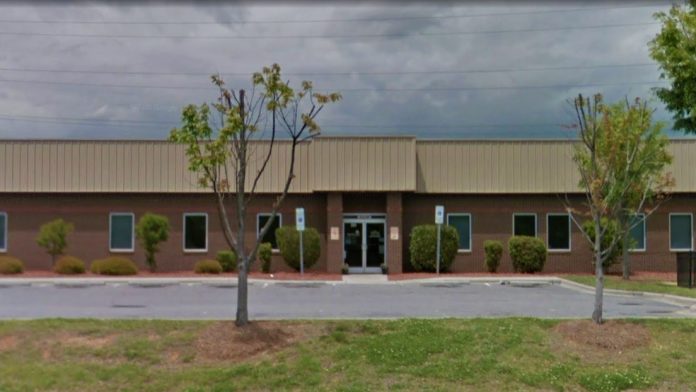Daymark Recovery Services – Cabarrus Center
284 Executive Park Drive Northeast
Suite 100
Concord, NC 28025

About Daymark Recovery Services – Cabarrus Center
Daymark Recovery Services provides substance abuse treatment for adults. You’ll find ‘em located in Concord, North Carolina. They offer outpatient services (OP) at this location, but for those needing higher-intensity care, they may provide referrals to their inpatient area. Intensive outpatient treatment (IOP) allows you to live at home and continue working or attending school while getting treatment.
Medication-assisted treatment (MAT) is available to help lessen withdrawal symptoms and reduce drug cravings. They use the FDA-approved medicine, Suboxone, to make guests more comfortable.
Individual and group counseling are included in the program. IOP takes place at least three days a week for at least nine hours each week. Individual sessions provide one-on-one time where guests can express any issues that may hinder recovery. You may uncover the root causes of your addiction and work on developing healthy coping and life skills to better handle stress. That way, you can prevent relapses and not depend on drugs.
Group counseling allows time with your peers in recovery who can understand your struggles with substance use. They’ll form a network and can stay with you when you graduate from the program. You’ll always have a sympathetic ear when temptation strikes.
Life skills training is available and may enhance your ability to maintain employment and work through problems that could arise after treatment. Life skills may include options like budgeting, time management, and conflict resolution.
Case management is available to help guide you through the program and to connect you to outside agencies and resources. Your case manager can coordinate services that are helpful for your recovery and medical care.
Family counseling is included in the program and may assist loved ones with understanding how the disease of addiction affects relationships. It can help with communication, appropriate boundary setting, and ongoing sobriety support.
Amenities
Private drug rehab provides a comfortable, secure environment that allows you to focus on doing the work to get your life back on track. Benefits include a higher staff-to-client ratio, increased one-on-one time with therapists and healthcare providers, private rooms for clients, and customized forms of therapy.
Addiction Treatment Programs
An adult program in North Carolina typically combines individual and group counseling, medical treatment, and various other therapies to treat substance use disorders. Treatment can take place in an inpatient or outpatient setting.
Alcohol rehab in North Carolina is a course of treatments that helps participants overcome alcohol dependency. Treatments address physical, mental, and emotional aspects of substance use disorder and help the individual develop healthy habits for long-term recovery.
Many therapists use cognitive behavioral therapy in North Carolina to treat substance use disorders. This goal-oriented method addresses maladaptive thinking and related beliefs that affect behaviors and can lead to addiction.
Men’s rehab in North Carolina offers customized treatment for men. These programs provide personalized treatment that is designed with the unique needs of men in mind.
To overcome opioid addiction, attend opioid rehab in North Carolina. Treatment takes place in inpatient or outpatient care, using a variety of therapies, medications, and other helpful interventions. Length of treatment caries, typically lasting 30, 60, or 90 days.
Elderly rehab in North Carolina provides specialized treatment for addiction among adults ages 55 and older or 65 and older. This treatment typically addresses dual diagnosis, substance use disorder, and age-specific concerns of seniors.
Women’s rehab in North Carolina allows women to receive gender-specific treatment tailored to their needs. Programs are available for alcohol, heroin, prescription drugs, benzos, and any other addictive substances, as well as co-occurring disorders.
When individuals participate in a young adult program in North Carolina, they feel more at ease in a setting that is age-appropriate. Activities, therapies, and aesthetics are all tailored for this age group, so participants can feel comfortable and are more likely to complete the program.
Assertive Community Treatment (ACT) is an integrative, community-based care strategy designed to address the needs of persons with severe and/or complex mental illness or behavioral disorders. ACT is typically provided by a multidisciplinary team of medical and mental health care providers, social workers, therapists, and other specialists, including addiction recovery professionals. These services are frequently provided in the home and community to clients in crisis, those who are clinically unstable, and those who are unable or unwilling to travel to a hospital or clinic for in-person treatment.
There are many types of drug rehab in North Carolina. To receive treatment for addiction, you can choose from many inpatient and outpatient programs. Often, participants start with detox and work through a full continuum of care that continues with ongoing support for long-term recovery.
Levels of Care
Outpatient rehab in North Carolina is often the next step for those who complete an inpatient program. This less restrictive treatment involves several hours of therapy per week, and accountability through 12-step meetings such as AA. You’ll continue this treatment as long as needed, which could be weeks, months, or years.
Aftercare rehab in North Carolina is a crucial part of relapse prevention. It gives you access to resources that will help you manage stress and overcome life hurdles. Typical services include career coaching, financial guidance, and ongoing counseling and emotional support. These may continue for a few months or more than a year after initial rehab.
Some of the most common co-occurring mental health disorders include anxiety, depression, and eating disorders. When these are present alongside substance use disorder, dual diagnosis treatment in North Carolina is necessary to address both conditions.
Recovery journeys often begin with intervention services in North Carolina. This treatment tool provides key support in planning and facilitating an effective intervention. Intervention specialists can also provide resources to develop treatment plans and guide families through the admission process.
When you choose inpatient drug rehab in North Carolina, you’ll live at a rehab facility for 28 to 90 days, depending on the program. Typical methods of treatment include group and individual therapy and family counseling.
Accreditations
Accepted Insurance

Contact Information
Nearby Treatment Centers

930 Lee-Ann Drive Northeast
Concord, NC 28025

300 Copperfield Blvd NE
#105
Concord, NC 28025

280 Executive Park Dr NE
Suite 160
Concord, NC 28025

380 Copperfield Boulevard Northeast
Concord, NC 28025